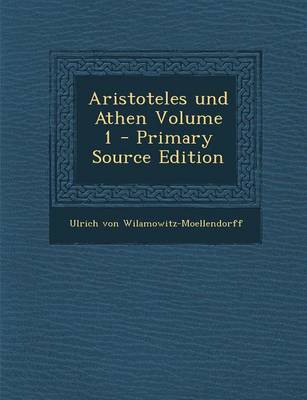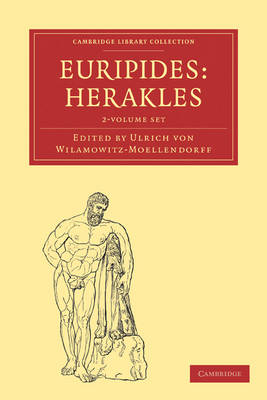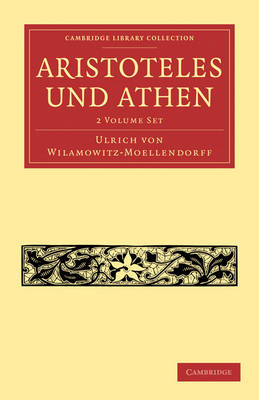Cambridge Library Collection - Classics
2 primary works • 5 total works
Volume 1
Ulrich von Wilamowitz-Moellendorff (1848-1931) was one of the most prominent German philologists of his time and his work is still well regarded. This book, originally published in 1893, is a detailed analysis of the The Constitution of the Athenians, then usually (though not universally) regarded as a work of Aristotle. Wilamowitz accepts Aristotle's authorship of the famous treatise on the history of the constitution that restored democracy after the oligarchy of the Thirty (403 BCE). In Volume 1, he investigates the historical sources employed by Aristotle, hypothesising that he was using at least two now lost works in addition to Herodotus and Thucydides, and that these were likely to be semi-official, contemporary chronicles of events in the city.
Volume 2
Ulrich von Wilamowitz-Moellendorff (1848-1931) was one of the most prominent German philologists of his time and his work is still well regarded. This book, originally published in 1893, is a detailed analysis of the The Constitution of the Athenians, then usually (though not universally) regarded as a work of Aristotle. Wilamowitz accepts Aristotle's authorship of the famous treatise on the history of the constitution that restored democracy after the oligarchy of the Thirty (403 BCE). Volume 2 reconstructs Athenian constitutional history on the basis of the work. A number of essays addressing topics on Athenian constitutional history and drawing on such figures as Solon, Peisistratus, Lysias and Isocrates are also included.
Die Dramatische Technik des Sophokles
by Tycho von Wilamowitz-Moellendorff and Ulrich Von Wilamowitz-Moellendorff
Published 1 March 2022
Euripides, Herakles 2 Volume Paperback Set
by Ulrich Von Wilamowitz-Moellendorff
Published 10 June 2010
Wilamowitz-Moellendorff's edition of Herakles was published in 1895. The renowned German philologist delivers a detailed reading and translation of Euripides' classic tragedy, and also provides the reader with an introduction to the context in which the tragedy unfolds. Volume 1 is divided into three parts. The first is an account of the origins of the story and a characterisation of the figure of Herakles as he first appears in Greek mythology. In part 2, Moellendorff interprets Euripides' version of the Heraclian figure and explains where and how this version of the tragedy differs from the original mythological framework. Part 3 gives Euripides' Greek text and Moellendorff's translation of the drama into German. Volume 2 is devoted to Moellendorf's commentary on the text and examination of the religious context in which Greek drama was performed - an aspect which the modern reader or spectator must always bear in mind.
Aristoteles und Athen 2 Volume Paperback Set
by Ulrich Von Wilamowitz-Moellendorff
Published 15 July 2010
Ulrich von Wilamowitz-Moellendorff (1848-1931) was one of the most prominent German philologists of his time and his work is still well regarded. This book, originally published in 1893, is a detailed analysis of the The Constitution of the Athenians, then usually (though not universally) regarded as a work of Aristotle. Wilamowitz accepts Aristotle's authorship of the famous treatise on the history of the constitution that restored democracy after the oligarchy of the Thirty (403 BCE). Volume 1 investigates the historical sources employed by Aristotle, hypothesising that he was using two now lost works in addition to Herodotus and Thucydides, and that these were likely to be chronicles of events in the city. Volume 2 reconstructs Athenian constitutional history on the basis of the work. A number of essays addressing topics on Athenian constitutional history and drawing on such figures as Solon, Peisistratus, Lysias and Isocrates are also included.



